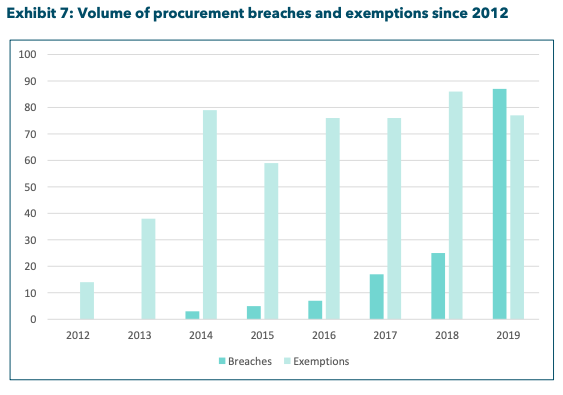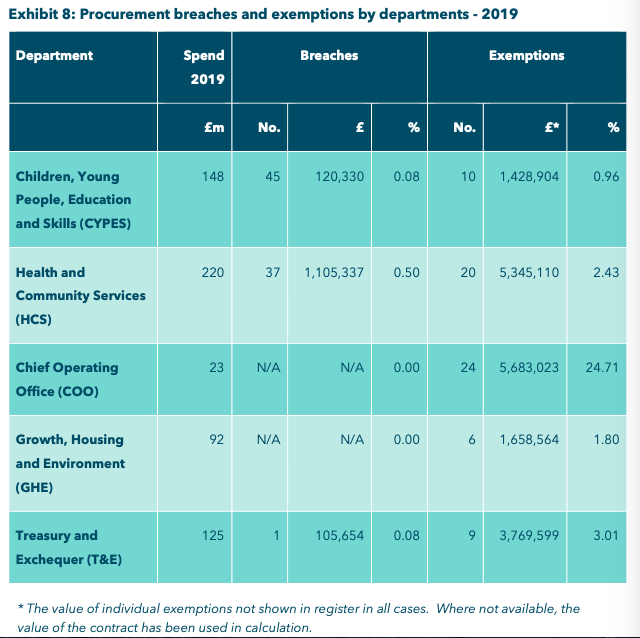


The Government spent over £20m on goods and services in 2019 without following official procurement rules - but no evidence has been found of any corruption, according to the island's spending watchdog.
The information came in a report focusing on the Government’s Anti-Corruption Arrangements, which was published today by Comptroller and Auditor General (C&AG) Lynn Pamment.
The new report concluded that the Government had policies and procedures in place to manage corruption risks associated with procurement, conflicts of interest and gifts and hospitality.
She however added there were weaknesses in some of those and described compliance as “variable."

Pictured: In her latest report, Lynn Pamment focused on the Government’s Anti-Corruption Arrangements.
The Government’s Procurement Best Practice Procedures (User Guide and Toolkit), for example, does not contain any reference to the actual risks of corruption which may guide the user.
The local Public Finances Manual sets out the procurement guidance for Government employees. It requires any breach - where guidance has not been followed - and exemption - where deviation has been approved for a valid reason - to be required.
“The requirement to record breaches and exemptions is good practice and can provide a snapshot of compliance when departments adhere to the requirement to record,” Ms Pamment wrote.
In 2019, there were 87 breaches, worth a total £1.3 million, some of which relating to expenditure without approved contracts in place.

Pictured: The number of procurement exemptions and breaches has been increasing since 2012.
77 exemptions, worth £18.8 million, were also recorded, with Ms Pamment noting that for 14 of those no reason had been given for the exemption. For half of those, the value of the exemption was not recorded while a second signature was not provided in 16 cases.
Those numbers are the highest since 2012 and come after Ms Pamment’s predecessor, Karen McConnell, recommended the Government improved controls and reduce the volume of exemptions after nearly 40 were recorded in 2013.
The Children, Young People, Education and Skills, and Health and Community Services departments accounted for the majority of the procurement breaches, with £120,300 and £1,105,337 respectively.
Those two departments, along with the Chief Operating Office, also account for the majority of procurement exemptions.
:
Pictured: The Children, Young People, Education and Skills, and Health and Community Services departments accounted for the majority of the procurement breaches in 2019.
Ms Pamment reviewed 10 of the breaches and 10 of the exemptions recorded in 2019 and found that the procedures for documenting the rationale for and approval of breaches and exemptions were working effectively in the majority of cases.
However, she noted one contract, worth over £60,000, for which an exemption had been approved on the grounds of urgency - despite evidence a procurement exercise could have been completed if it had started had soon as the need arose.
Documents showing how the risks of the potential for perceived conflicts of interest had been considered and mitigated in this case were also missing.
She wrote: “It is important to ensure that there is a compelling case for all procurement exemptions that are approved to ensure that an appropriate compliance culture is maintained and value for money in procurement can be demonstrated.”
Ms Pamment recommended updating the Government’s Procurement Best Practice Procedures with additional guidance on potential risks of corruption as well as “rigorous” requirements for managing conflicts of interest.
She also recommended refresher training to remind departments of the need for compliance to reduce the volume of breaches and exemptions.
Responding to the report, Treasurer Richard Bell said: “I’d like to thank the C&AG for her report. While her findings are encouraging, there is no doubt that there is still work to do to ensure that employees, States Members and Ministers are fully aware of their responsibilities in this important area and that we have the right policies and codes of conduct in place to support them.”
The Government will now consider the report and its recommendations and will respond fully in due course.
Comments
Comments on this story express the views of the commentator only, not Bailiwick Publishing. We are unable to guarantee the accuracy of any of those comments.